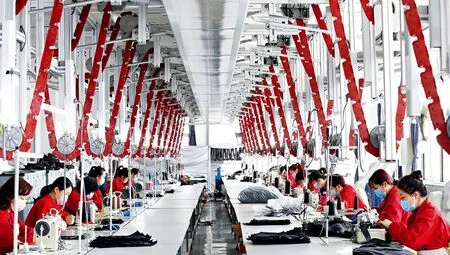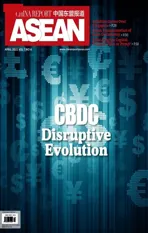GUIDELINES FOR THE CHINESE ECONOMY AND GLOBAL COOPERATION IN THE POST-PANDEMIC WORLD
2022-06-23BySelcukColakoglu
By Selcuk Colakoglu
The roadmap-style report contained not only a summary of the Chinese government’s work over the past year, but also outlined the country’s future priorities and goals for socioeconomic development
This year’s government work report was delivered by Chinese Premier Li Keqiang at the fifth session of the 13th National People’s Congress (NPC), China’s national legislature, in Beijing on March 5. As was expected, the 2022 government work report revealed a slew of key economic targets, such as China’s gross domestic product (GDP) growth, employment and foreign trade. The roadmap-style report contained not only a summary of the Chinese government’s work over the past year, but also outlined the country’s future priorities and goals for socioeconomic development. Furthermore, the 2022 report was released in the second year of the 14th Five-Year Plan period (2021-2025) as the world was reeling from the lingering COVID-19 pandemic, weak economic recovery, and volatile regional situations.
Economic Targets
The pandemic has created unexpected repercussions for the world economy. Many economies have suffered dramatically. China is one of the few countries able to overcome these grave economic challenges in just a year. Despite sporadic COVID-19 resurgences and a complicated external environment, China’s GDP in 2021 expanded 8.1 percent to 114 trillion yuan (about US$18 trillion) while its GDP per capita rose to 80,976 yuan (US$12,551), surpassing the global average. China is now a fast-growing “middle-income country.” China has set its GDP growth target at around 5.5 percent for 2022.
Foreign direct investment (FDI) into the Chinese mainland, in actual use, hit a record high of 1.15 trillion yuan (US$173.5 billion) in 2021. China’s FDI will likely remain robust in 2022, with its large domestic market and strong manufacturing base continuing to attract foreign investors. As a reflection of this, China rose to 12th on the Global Innovation Index 2021 released by the World Intellectual Property Organization, making it the only middle-income economy to rank in the top 30.
China was also successful in keeping its supplies stable to both national and international markets during the pandemic. As a major player in the global supply chain, China’s stable economic function kept the global economy uninterrupted as much as possible during the hectic days of the pandemic. China’s swift economic recovery has been a promising sign for sustainable global economic growth in the coming years during the postpandemic period.
China also plays an expanding global role and takes responsibility for environmental protection. In fact, the Chinese government aims to promote green development and ensure that China meets its targets for nationally determined contributions in response to climate change by 2030. China will expedite the transition of its growth model to green development and promote both high-quality economic growth and high-standard environmental protection. Energy consumption per unit of GDP and carbon dioxide emissions per unit of GDP will be reduced by 13.5 percent and 18 percent, respectively. Clean energy consumption accounted for 25.3 percent of China’s total energy consumption in 2021. China also declared its commitment to achieve carbon neutrality by 2060 through its green growth strategy.
The year 2022 will be crucial for China to align efforts to consolidate and expand poverty alleviation achievements with rural revitalization endeavors. In February 2021, China declared elimination of absolute poverty after lifting nearly 100 million rural poor people out of poverty over eight years. China plans to create more than 11 million new jobs in 2022 according to the government work report. With the pandemic hampering global poverty reduction efforts, Chinese President Xi Jinping recently said that China would take an active part in the Global Development Initiative, which aims to accelerate the implementation of the 2030 Agenda for Sustainable Development and build a global community of development with a shared future.

Workers with a company in Qingdao, Shandong Province, produce aircraft life jackets for export, on February 23, 2021. (LIANG XIAOPENG)
China Calls for Multilateralism to Combat Aggregated Global Challenges
Today’s world is facing grave challenges ranging from the pandemic to developmental problems and climate change. Global challenges and transborder disasters like COVID-19 cannot be handled at the national level. Upholding a spirit of true multilateralism, China has been actively participating in the reform of the global governance system to make globalization more open, inclusive, balanced, and beneficial for all.
Developing good global governance is key to handling all these difficulties in a proper and timely manner. China stands ready to work with all other countries in the international community to make new and greater contributions to promoting world peace, stability, development, and prosperity, according to the 2022 government work report submitted to the national legislature for deliberation. Promoting common prosperity and improving people’s lives were also the goals of China’s global responsibility efforts.
China has always been a staunch supporter of multilateralism and insisted on solving all global issues through dialogue. It recently underlined “economic globalization” as the path to achieving sustainable development and poverty alleviation at the global level. Chinese initiatives are key to supporting developmental momentum in developing countries.
In 2022, China will promote highquality cooperation under the Belt and Road Initiative (BRI), according to the government work report. Facing a depressed world economy, China is committed to promoting common development of all nations. On top of a series of growth-driving measures, the BRI has become the world’s broadest-based and largest platform for international cooperation. The BRI has become the engine of growth and modernization of the economic infrastructure of many countries. For instance, at the beginning of 2022, foreign ministers from Saudi Arabia, Bahrain, Kuwait, Oman, Turkey, and Iran, as well as the secretary general of the Gulf Cooperation Council, visited China, testifying to those countries’ growing enthusiasm for cooperation with China. The BRI provides a framework for cooperation between China and the Middle East countries. Many new BRI-related projects will start in Asia, Africa, and Europe before the end of 2022.
Concrete Action to Fight the Pandemic
Since the outbreak of COVID-19, China has conducted close cooperation with international organizations and forums like the World Health Organization (WHO) and the G20 to fight the pandemic effectively at the global level. To combat the pandemic worldwide, China has also proposed the COVID-19 vaccine be a global public good and advocated global vaccine cooperation. At present, China is the world’s largest provider of COVID-19 vaccines.
In total, China has provided over 2.1 billion doses of COVID-19 vaccines to more than 120 countries and international organizations, accounting for a third of the total vaccinations outside China.
Recently, China announced that it would provide another 1 billion doses to African countries:600 million given as donations and the other 400 million provided through joint production between Chinese and African institutions. In addition, the country will donate 150 million more doses to member countries of the Association of Southeast Asian Nations (ASEAN). Chinese companies have also launched joint production and filling plants with some developing countries, and the annual manufacturing capacity of such projects has exceeded 1 billion doses.
The international community still faces grave economic, developmental, environmental, and diplomatic challenges in the early post-pandemic era. Rising trends of economic and political unilateralism and protectionism are still aggravating global challenges. The 2022 government work report clearly shows that China will stick to its commitment to support multilateralism and global governance to build a cooperative world.
